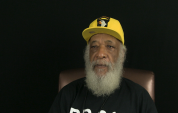3:36 | Vietnam had a lot of bad terrain, a lot of climbing. The enemy fought well, recalls Donald Singleton. In fact, if they'd had our resources, he feels the outcome would have been much worse.
Keywords : Donald Singleton Vietnam mountains pills North Vietnamese Army (NVA) Viet Cong (VC)

His father was a turpentine worker and he put Donald Singleton to work at an early age. The young man resented it but he learned the value of hard work. He thought about joining the military from an early age and when he saw his cousin decked out in Airborne gear, that was it. He was going Airborne.
Donald Singleton already knew he wanted to be a paratrooper but when he wasn't taken in the draft, he left home and went to work. Three years later, he went home to visit and his father tried to get him to go back to work with him in the turpentine woods. Time to enlist.
When Donald Singleton enlisted in the Army, he didn't know anything about Vietnam. The first thing he learned when he stepped off the plane is that it's hotter than anywhere, and he grew up in Georgia. Before going to his unit, he went to a short school on booby traps. Then, it was on to the front area at Tuy Hoa.
There was Home Boy and Preacherman and a guy from the Virgin Islands. Donald Singleton describes some of the characters in his platoon. Years later, a chance meeting in a parking lot led to a reunion with one of them.
It was during mail call, which was always a great time for the men, opening and sharing treats from home. It was raining, naturally, and there was a fire going in a steel drum. Suddenly, there was an explosion. It was years later that Donald Singleton learned why it happened.
They were searching for a fallen comrade's body when they walked into an ambush. An enemy hand grenade came in, and one of the men, Dale Wayrynen, threw himself on it and was killed. He was awarded the Medal of Honor, posthumously. Several were wounded, including Donald Singleton, who sought out his family after the war.
It was bad enough that you could get blown away any second, but there were also snakes. Lots of them. Some, very poisonous. For Donald Singleton, another big problem was telling friend from foe. You could not tell the difference. Two things he was sure of, the peaches in the C-rations and his trusty P-38 can opener.
In what down time there was, you could play ball or drink beer or go to the town and the local restaurants and clubs. There was Stars and Stripes and mail from home. If you got food, you had to share. That was OK with Donald Singleton. They all had each others' back.
The racial climate in the late 60's was tense everywhere. From his high school days to the Army, racism and segregation played a big part in Donald Singleton's life. He faced a soul searching moment when he was deployed to the streets of Washington DC after the assassination of Martin Luther King.
His MOS had changed to cook at the end of his Vietnam tour. After that, Donald Singleton went to the 82nd Airborne and continued as a cook. Cooks had it made, there. He fondly remembers certain C-rations, though, which were his favorites. Know where he can get any?
Within a month of getting out of the Army, Donald Singleton went to work on the railroad. He became a locomotive engineer, but he had to deal with the usual racism of the time.
It was The Temptations and Otis Redding playing on the reel to reel tape players back in Vietnam. That's what Donald Singleton remembers and he wants the younger generation to remember something, too. He wants them to remember and care for all veterans. They aren't getting any younger.